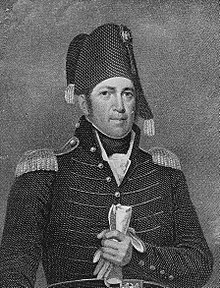Jacob Brown
Jacob Jennings Brown (born May 9, 1775 in Bucks County , † February 24, 1828 in Washington, DC ) was an American Army officer in the British-American War from 1812 to 1814. He was active on the northern border of the United States. In 1821 he was appointed Commanding General of the United States Army . He kept this post until his death.
Life
In 1807 Brown became commander of the 108th regiment of the New York Militia. Four years later he was made Brigadier General , a post he still held when the war broke out in 1812. Although he opposed the war, he organized defensive positions in the Great Lakes region . On May 29, 1813, troops under Brown's command defeated the English, after which he was appointed brigadier general of the regular army. In 1814 he captured Fort Erie in Ontario and won the Battle of Chippewa . He was later wounded.
In November 1814, the United States Congress authorized Brown to be awarded the Congressional Gold Medal .
After him are
- Brown County in Illinois
- Brown County , Indiana
- Brown County in Ohio
- Brown County , Wisconsin
named.
Web links
- Commander
- Jacob Brown's grave site
- Jacob Jennings Brown papers , William L. Clements Library, University of Michigan.
| personal data | |
|---|---|
| SURNAME | Brown, Jacob |
| ALTERNATIVE NAMES | Brown, Jacob Jennings (full name) |
| BRIEF DESCRIPTION | American Army officer in the British-American War |
| DATE OF BIRTH | May 9, 1775 |
| PLACE OF BIRTH | Bucks County |
| DATE OF DEATH | February 24, 1828 |
| Place of death | Washington, DC |
